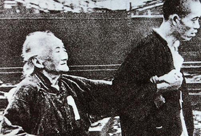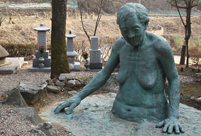BEIJING -- Being doctors isn't easy for surgeon Liu Peng, 32, and his colleagues. All have been subject to violence or verbal assault by patients at some time.
In 2008, Liu needed five stitches when was punched in the eye by a drunk patient as he tried to stop him attacking a colleague at West China Medical Center of Sichuan University in southwest China's Sichuan Province.
The drunk man was deliberately seeking revenge against the public hospital and its staff. Liu felt deeply wronged back then, but as he observes more doctor-patient tensions in his department, he has begun to accept such tension as a part of his life.
"Everyone in my department is used to it," he said.
Intense doctor-patient conflicts are only one of the problems of China's public hospitals, which provide 90 percent of the country's medical services.
Patients complain of high bills and poor quality services. Doctors complain of heavy stress and low salaries. Doctors are over-prescribe to make profits for public hospitals and obtain bonuses.
To end the tug-of-war between doctors and patients as well as other problems, China has promised health care reform this year.
Li Bin, minister in charge of the National Health and Family Planning Commission, said at a press conference on Thursday that authorities will "bite into the hard bone of public hospital reform".
He promised optimal distribution of resources, eradication of the compensation system for prescriptions, improvements to hospital management and reform to the payroll system, said Li.
In a report to the National People's Congress, China's parliament, on March 5, Premier Li Keqiang talked of expanding a pilot program to about 1,000 county-level public hospitals, dealing with about 500 million rural people.
Full scale reform of the health care system got underway in 2009. Pilot projects for public hospital reform were a priority, along with a basic medical security system, improvement at grass roots level and equal access to basic public health services.
Some big public hospitals in megacities have started to cut patients' spending on drugs and use a system of outpatient services that increases the registration fee for diagnosis and treatment. Such measures have stopped hospitals overcharging through sale of drugs, and increased doctors incomes. Over 300 county hospitals ran pilot programs in 2013.
Qi Enlai, vice president of the Tuberculosis Hospital of Tangshan City in northeast China, believes the reform is promising and millions of people, especially those in the grass-roots hospitals will benefit from improved medical services.
The orientation of the reform was to make more public hospitals into non-profit organizations, however, local public hospitals are under financial pressure to implement the reform, Qi said.
Government subsidies were not enough to cover the operation costs and hospitals have to make up the shortfall, so it is difficult to implement the reform, he said.
Moreover, doctors at grass-roots communities are underpaid and it was difficult for small hospitals to stay competitive because of the brain drain, he said.
The principal way to solve problems of China's public hospital is to increase the mobility of doctors, according to Zhu Hengpeng, director of the Center for Public Policy, Institute of Economics under the Chinese Academy of Social Sciences.
Public hospitals in China are financed by the state and regulated by health authorities. Instead of opening private clinics, the best doctors in China work for public hospitals because the latter provided them with stable jobs and have the best medical facility. Doctors are bound to public hospitals by agreement and mobility is low for doctors in China, except for retirees.
"Hospitals are run like government institutions," said Zhu, adding the tenure job system offered by public hospitals to its staff is an impediment to innovation.
Doctors should be free to choose their employers or to be self-employed and their income should be determined by their skills instead of the professional titles they hold, he said.
If doctors were freed, there would be more competition and a better health service for grassroots communities, he said.
 Chaihe village, pure and peaceful fairyland in snow
Chaihe village, pure and peaceful fairyland in snow Belgians warmly welcome arrival of China's giant pandas
Belgians warmly welcome arrival of China's giant pandas Female marines receive tactical training in NW China
Female marines receive tactical training in NW China Blood memory: Nanjing Massacre in 1937
Blood memory: Nanjing Massacre in 1937 Top 10 pure beauties in showbiz
Top 10 pure beauties in showbiz British WWII veteran: I can't forgive Japan
British WWII veteran: I can't forgive Japan Tongban's dream of prosperity
Tongban's dream of prosperity Chinese frigate Yancheng holds drills in Mediterranean Sea
Chinese frigate Yancheng holds drills in Mediterranean Sea A visit to comfort woman's home in South Korea
A visit to comfort woman's home in South Korea Fairyland? Qingdao in sea of clouds
Fairyland? Qingdao in sea of clouds Top 10 most handsome faces in Asia in 2013
Top 10 most handsome faces in Asia in 2013 Female celebs with beautiful long legs
Female celebs with beautiful long legs Cat 'guardians' in Forbidden City
Cat 'guardians' in Forbidden City Large numbers of ancient coins excavated in Inner Mongolia
Large numbers of ancient coins excavated in Inner Mongolia Leisurely life beneath Zhonggulou, where time travels slower
Leisurely life beneath Zhonggulou, where time travels slowerDay|Week|Month